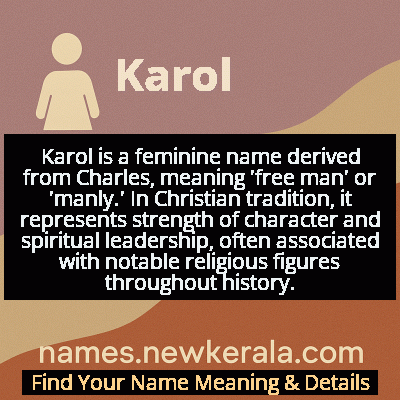Karol Name Meaning & Details
Origin, Popularity, Numerology Analysis & Name Meaning of Karol
Discover the origin, meaning, and cultural significance of the name KAROL. Delve into its historical roots and explore the lasting impact it has had on communities and traditions.
Name
Karol
Gender
Female
Origin
Christian
Lucky Number
3
Meaning of the Name - Karol
Karol is a feminine name derived from Charles, meaning 'free man' or 'manly.' In Christian tradition, it represents strength of character and spiritual leadership, often associated with notable religious figures throughout history.
Karol - Complete Numerology Analysis
Your Numerology Number
Based on Pythagorean Numerology System
Ruling Planet
Jupiter
Positive Nature
Optimistic, inspirational, and creative.
Negative Traits
Scattered, exaggerating.
Lucky Colours
Yellow, gold, purple.
Lucky Days
Thursday.
Lucky Stones
Yellow sapphire.
Harmony Numbers
1, 2, 9.
Best Suited Professions
Arts, writing, communication.
What People Like About You
Creativity, optimism.
Famous People Named Karol
Karol Wojtyła
Religious Leader
Served as Pope John Paul II from 1978-2005, first non-Italian pope in 455 years
Karol G
Singer
Award-winning Colombian reggaeton artist with multiple chart-topping hits
Karol Szymanowski
Composer
Influential Polish composer of the early 20th century
Karolína Plíšková
Tennis Player
Former world No. 1 tennis player from Czech Republic
Name Variations & International Equivalents
Click on blue names to explore their detailed meanings. Gray names with will be available soon.
Cultural & Historical Significance
The name carries strong Christian associations through its connection to numerous saints and religious figures named Charles throughout history. In many Catholic communities, the name Karol is chosen to honor Saint Charles Borromeo or Pope John Paul II, representing faith, leadership, and moral strength. The feminine usage of Karol, while less common than masculine usage in some regions, represents a modern approach to traditional naming conventions while maintaining religious and cultural connections. The name's journey from masculine to feminine usage reflects evolving gender norms while preserving its historical and spiritual significance.
Extended Personality Analysis
Women named Karol are often perceived as strong, independent individuals with natural leadership qualities. They tend to be determined and resilient, capable of overcoming challenges with grace and perseverance. The name's meaning of 'manly' or 'free person' often translates to personality traits such as courage, self-reliance, and the ability to take charge in difficult situations. Many Karols exhibit a balanced combination of traditional values and progressive thinking, making them adaptable to various social contexts.
In interpersonal relationships, Karols are typically loyal and protective of those they care about, often serving as pillars of strength within their families and communities. They possess a practical wisdom and are known for their reliability and sense of responsibility. While they can be assertive when necessary, they also demonstrate compassion and understanding, creating a unique blend of strength and sensitivity that makes them effective in both professional and personal spheres. Their inherent dignity and self-possession often command respect from others, while their warmth and genuine concern for people create deep, lasting relationships.
Modern Usage & Popularity
In contemporary naming practices, Karol maintains a distinctive presence, particularly within Polish, Czech, Slovak, and Latin American communities where it continues to be used for both genders, though feminine usage has become more notable in recent decades. The name experienced renewed interest in the early 21st century, influenced by the global legacy of Pope John Paul II and the rising fame of Colombian singer Karol G. While not ranking among the most popular names in English-speaking countries, it holds appeal for parents seeking a name with European heritage, Christian significance, and gender-neutral potential. Modern usage reflects broader trends toward international names and the breaking of traditional gender boundaries in naming conventions, while still honoring cultural and religious traditions.
Symbolic & Spiritual Meanings
Symbolically, Karol represents the convergence of strength and spirituality, embodying qualities of resilience, moral courage, and leadership. The name carries the paradoxical symbolism of 'manly' attributes applied to women, representing the modern ideal of feminine strength that incorporates traditionally masculine virtues like courage and independence without sacrificing feminine qualities. In Christian context, it symbolizes spiritual warfare and the strength to defend one's faith against adversity. The name also represents freedom and self-determination, reflecting its etymological roots while adapting to contemporary values of gender equality and personal autonomy. It serves as a bridge between tradition and progress, honoring historical religious figures while embracing modern interpretations of strength and identity.

